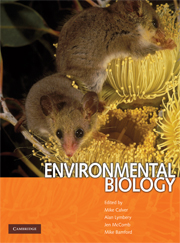Book contents
- Frontmatter
- Contents
- List of contributors
- Preface
- Acknowledgements
- Theme 1 What is environmental biology?
- Theme 2 The scientific method and the unifying theories of modern biology
- Theme 3 Applying scientific method – understanding biodiversity
- Theme 4 Applying scientific method – biodiversity and the environment
- Theme 5 The future – applying scientific method to conserving biodiversity and restoring degraded environments
- Glossary
- Index
Theme 2 - The scientific method and the unifying theories of modern biology
- Frontmatter
- Contents
- List of contributors
- Preface
- Acknowledgements
- Theme 1 What is environmental biology?
- Theme 2 The scientific method and the unifying theories of modern biology
- Theme 3 Applying scientific method – understanding biodiversity
- Theme 4 Applying scientific method – biodiversity and the environment
- Theme 5 The future – applying scientific method to conserving biodiversity and restoring degraded environments
- Glossary
- Index
Summary
From Theme 1 you understand the central place of the human species in environmental biology today. You also have a general understanding of science and how it might be applied to solving biological problems.
Biologist Hugh Gauch listed five key resources for research in the sciences:
equipment to collect data
computers and software for data analysis
infrastructure, including libraries, colleagues and internet access
technical training to use all the above, and
a knowledge of the scientific method.
He argued that good research was often most impeded by a poor understanding of the fifth point, the scientific method.
Therefore in this second theme of Environmental Biology we explore the nature of the scientific method in detail. We also examine two of its most important contributions to modern biology: the great unifying theories of the cell and of evolution.
- Type
- Chapter
- Information
- Environmental Biology , pp. 21 - 22Publisher: Cambridge University PressPrint publication year: 2009



